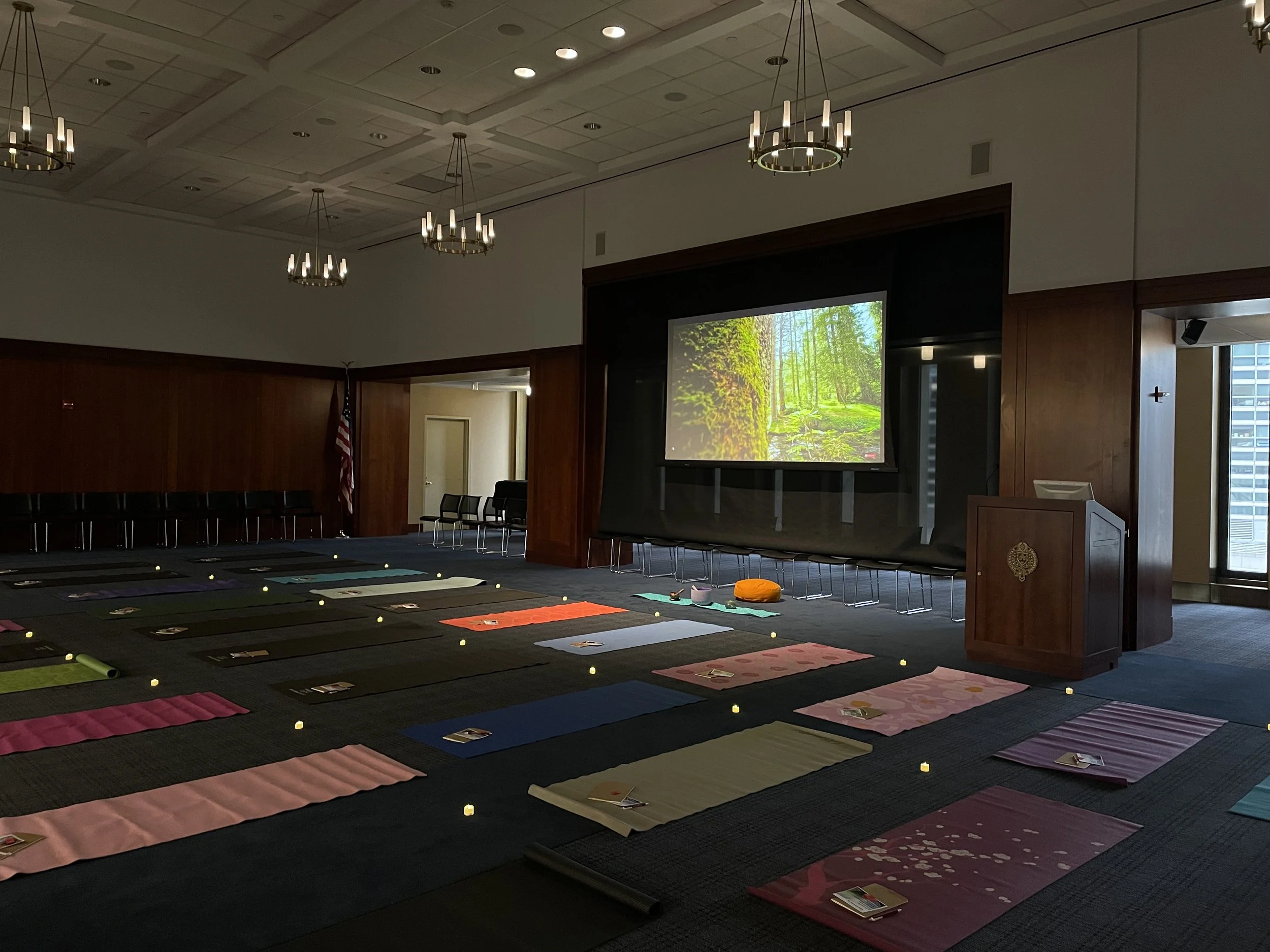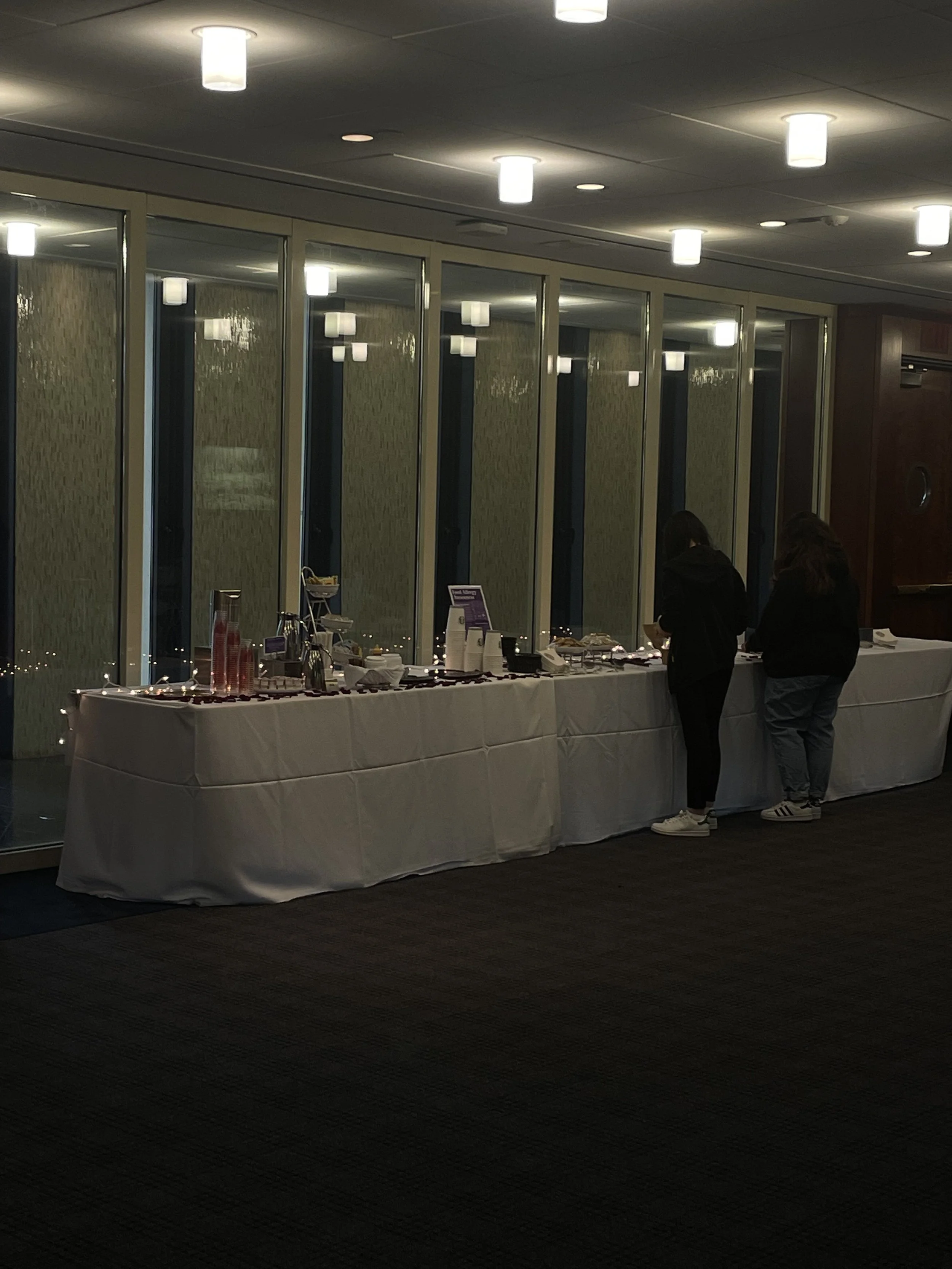PJI’s Fall Event Encourages Students to Rest Radically
by Yev Gelman
On Friday, October 6th, the 12th floor lounge of FCLC’s Leon Lowenstein building transformed completely. The main room, lined with yoga mats, was lit softly by little tea candles spread out on the floor, and behind them, the buffet table had been decorated with fairy lights and rose petals. On the table were several trays of finger sandwiches, pastries, and biscuits, along with various tea offerings. The spread was soundtracked by ethereal, meditative music from a forest meditation video playing on the projector screen. On the whole, the effect was stunning: a result of first-time collaboration between Sarah Gambito (Creative Writing Program head and Poetic Justice Institute founder) and Carol Gibney (the head of Ignatian Spirituality and Yoga community of Fordham’s Campus Ministry). Together, the two of them planned and organized this semester’s PJI event Rest Is Resistance, during which Carol led a group of students, faculty, and guests through a dream yoga practice, followed by reflective journaling.
The event began with a high tea reception catered by the Fordham Dining staff, at which the event’s attendees and organizers were able to mingle. My fellow Poetic Justice Institute fellows and I welcomed guests with a suggestion to “lay their burdens down,” literally, by leaving their bags on the other side of the room before beginning to enjoy the event. The co-sponsorship by PJI and Campus Ministry meant that the attendees were a diverse group, ranging from Sarah Gambito’s colleagues from Kundiman –– her non-profit organization supporting AAPI writers –– to my Fordham Theatre classmates, and to members of various spiritual communities on campus. Sucked into a conversation with Sarah and several people I had never met, I was thrilled and shocked to discover that one of them was Monica Sok, an award-winning poet whose work I have read in various Fordham writing workshops. Being able to speak with her in such a calming, casual space reminded me that even the poets that I most admire are, in the end, fellow tea-lovers and, like me, in deep need of rest.
The main programing of the afternoon was launched by a reading from spiritual leader, social worker, and Fordham faculty member Derek Tice-Brown, whose research centers around yoga therapy practices and LGBTQ+ health. Derek read an excerpt from the book whose title our event was inspired by: Tricia Hersey’s Rest Is Resistance: A Manifesto, which explores rest as a tool of liberation for those oppressed under capitalism and white supremacy.
After the reading, Carol led the group through an hour-long session of dream yoga –– a practice which I had not been previously exposed to. During that hour, Carol encouraged us to connect to our bodies through profound relaxation, leading the participants to enter a physical state somewhere between consciousness and sleep. In this state, we were able to respond to her imagery in a dream-like, hyper-sensual vividness without letting go of deep relaxation. During the session, Sarah and Derek went around the room offering Reiki placements to willing participants. Reiki –– a Japanese form of energy healing –– is used to encourage self-healing through the transference of a “universal energy” from the practitioner’s hands to the participant’s body. Since our eyes were closed for most of the dream yoga session, none of us knew exactly when Sarah and Derek would come around to perform the placement. Mine came at a turning point in Carole’s guidance: an instruction to find and channel the deepest desire, or wish, within us. I remember it vividly: wishing, silently, for connection and community, followed immediately by Sarah’s hands on my forehead, not even remembering why they would be there. It was as if the universe had heard me.
After the dream yoga session had ended, Sarah guided the participants in a reflective journaling prompt. Her question was simple: “How will you protect your rest?” Many of us, I imagine, didn't know the answer. Most of us wrote anyway.
As the lights came up, and we began rolling up our yoga mats, I felt a strange sense of peace. I had somewhere to be afterwards, but I lingered anyway –– to drink more tea, talk to my fellow guests, or just rest.

